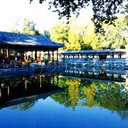Chemopreventive effects of Ku-jin tea against AOM-induced precancerous colorectal lesions in rats and metabolomic analysis.
Słowa kluczowe
Abstrakcyjny
Ku-jin tea (KJT) is a health beverage prepared from the leaves of the plant Acer tataricum subsp. ginnala that has been consumed in some regions of China for thousands of years. KJT contains high levels of anti-inflammatory and antioxidative compounds such as ginnalins, but little is known about the chemopreventive effect of KJT on colon cancer. In this study, we investigated the preventive effects of KJT on colon carcinogenesis using the azoxymethane (AOM)-induced precancerous colorectal lesion model in rats. The results showed that the number of aberrant crypts, aberrant crypt foci (ACF) and crypts/focus in rats of the KJT + AOM group were significantly decreased compared with rats of the AOM group (p < 0.01). Further exploration of the prevention mechanism of KJT by UPLC-QTOF/MS-based urinary metabolomics showed that 5 metabolic pathways were modulated, including purine metabolism and amino acid metabolism, in the group with KJT. In addition, the levels of the immunomodulatory cytokines IL-1α and IL-10 were significantly decreased, and the levels of IL-2 in the serum of AOM rats increased after KJT treatment. Our present data suggest that KJT can inhibit AOM-induced colonic ACF formation and might be a useful chemopreventive agent against colorectal carcinogenesis.




